At Pledge 1%, we encourage and empower companies to donate 1% to ANY charity of their choosing. Today, we want to highlight Pledge 1% member Lookout which is committed to promoting Women & STEM. On May 18 and 19, Lookout and Secure Diversity are producing the eighth Day of Shecurity (DOS) conference, free for all women and nonbinary people to attend.
DOS is a Lookout’s homegrown conference that advocates for gender diversity in cybersecurity, uplifting and empowering women and non-binary individuals to share their personal and professional experiences and offering learning opportunities and company connections for those looking to start or grow their cybersecurity careers. Want to get involved?
Sponsorship opportunities are still open, and registration tickets are still available.
Sponsorship: https://www.dayofshecurity.com/how-you-can-help
Registration: https://hopin.com/events/dos-may-2023?utm_source=Pledge%201%25&utm_campaign=May%202023
Pledge 1%’s #WomenWhoLead series celebrates female leaders who are paving the way for the next generation. While our featured leaders come from a variety of backgrounds and industries, they are united in their efforts to promote equality for all women in the workplace. We’ve asked them to share a bit about their journey to success, as well as lessons they’ve learned along the way.
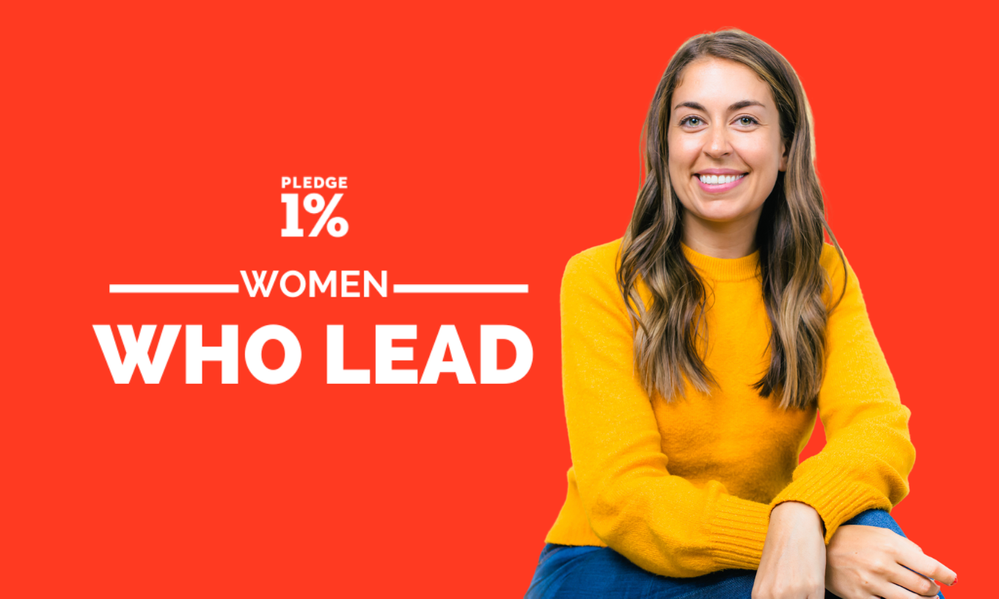
Katie Stasiulewicz
Director of Sales and Success, NextChapter
Columbus, OH
What is your current role? Briefly describe in 1-2 sentences.
I oversee the sales, customer success and marketing departments at NextChapter which is a cloud-based software application for attorneys to prepare, manage and file their cases online.
This year’s International Women’s Day theme is “Embrace Equity.” What does this mean to you? How can we build workplaces that are more equitable and inclusive?
As a manager, my goal is to create a safe and comfortable work environment for all employees. I am a strong advocate for equal pay behind the scenes, regardless of race or gender, until workplaces start to implement more transparent salary and benefit policies.
Do you have any mentors or role models who have helped you on your personal journey?
I have been lucky to consistently work for female leaders. Each has played an immense role in mentoring me, believing in me and supporting me to grow my role in ways that align with my personal skills.
What’s the best piece of advice you ever received?
Be your own best advocate
The past few years have brought many new and unprecedented challenges. What keeps you motivated or inspires you to stay optimistic?
My team. I work with so many kind and intelligent teammates that believe in the work they do and also allow me to build personal relationships with them. Being able to advocate for them and help them grow within their career is what keeps me motivated.
Pledge 1% helps companies of all sizes and stages leverage their assets for social good. Why do you think it’s important that companies prioritize social impact? Do you have any specific stories or examples from your work or colleagues you can share?
NextChapter offers bankruptcy software and bankruptcy can be looked at as such a taboo subject but it’s not all negative. Monetary stressors can happen to anyone, sometimes very unexpectedly and that is a huge burden on individuals and families. To be able to offer our product pro bono to attorneys that are willing to help their clients pro bono is a win-win.
If you could describe yourself in one word what would that be and why?
Calm. I don’t tend to overthink a ton, especially at work. And I hope that inspires my team to not hold on to common stressors.
What are you looking forward to this year? Are there any goals (personal or professional), activities, or experiences you are excited about?
Definitely more travel! I try to visit at least two countries per year that I haven’t been to before. That is something I don’t take for granted after losing the freedom to travel during the pandemic.
Originally posted on channelfutures.com

Diversity, equity and inclusion (DE&I) is a long-standing value at Salesforce, and they believe that businesses can be a powerful platform for change. That value doesn’t stop at their doorstep.
Beyond the tens of thousands of people Salesforce employs directly, the company has an ecosystem of more than 11,000 partners around the globe and over 200,000 credentialed experts who help their joint customers get the most out of Salesforce. And the Salesforce ecosystem is projected to grow to almost six times the size of Salesforce by 2026, creating 9.3 million jobs.
Salesforce sees ensuring that a diverse talent pool is prepared to fill these roles and start new equitable businesses in the ecosystem is an important way to grow their impact exponentially.
“We’re committed to our equality goals and working across our ecosystem with employees, partners and customers to drive progress and increase business value,” said Lori Castillo Martinez, Salesforce’s chief equality officer. Martinez is a member of Channel Futures’ 2022 DE&I 101, which recognizes individuals driving DE&I in the information and communications technology channel.
The company’s first Partner Ecosystem Equality Report showcases how far they’ve come in ushering in diverse, equitable and inclusive partner businesses in the United States. It also establishes a transparent benchmark for tracking progress toward equality in Salesforce’s Partner Ecosystem.
An Inclusive Workforce
A key strategy for promoting ecosystem equality is enabling those historically left out of the tech industry to skill up and connect with potential employers at partner companies. Salesforce has measured their progress on this front by tracking:
- Hiring through the Salesforce Talent Alliance, an initiative that connects partners with skilled candidates trained on Salesforce’s free online learning platform Trailhead, with an emphasis on inclusion. In all, Salesforce Talent Alliance has helped 22,000 individuals from all walks of life start their careers in the Salesforce ecosystem. Partners who pledged to work with Talent Alliance candidates reported that 27% of the hires in 2022 came from ethnically and/or racially underrepresented groups in technology, 38% of whom were women.
- Attendance at career fairs to look for open positions within the ecosystem. In the past year, Salesforce saw strong participation in career fairs; of these individuals, 40% were Black, 13% were LatinX, and 21% were new immigrants and refugees.
- Completion of Salesforce Fundamentals, a free three-week course that prepares job-seekers for their first roles in the ecosystem. In the past year, 55% of participants were women and 44% identified as underrepresented minorities (URMs).
- Participation in the free live learning experiences that Salesforce sponsors on Clicked, which enable people to practice their skills, build portfolios and explore career options in the ecosystem. Sixty-seven percent of those seeking jobs at partner companies through Clicked were women and nearly half were URMs.
Going forward, Salesforce will continue to drive a pipeline of diverse new talent prepared to fill in-demand roles within the ecosystem.
Pledge 1%’s #WomenWhoLead series celebrates female leaders who are paving the way for the next generation. While our featured leaders come from a variety of backgrounds and industries, they are united in their efforts to promote equality for all women in the workplace. We’ve asked them to share a bit about their journey to success, as well as lessons they’ve learned along the way.
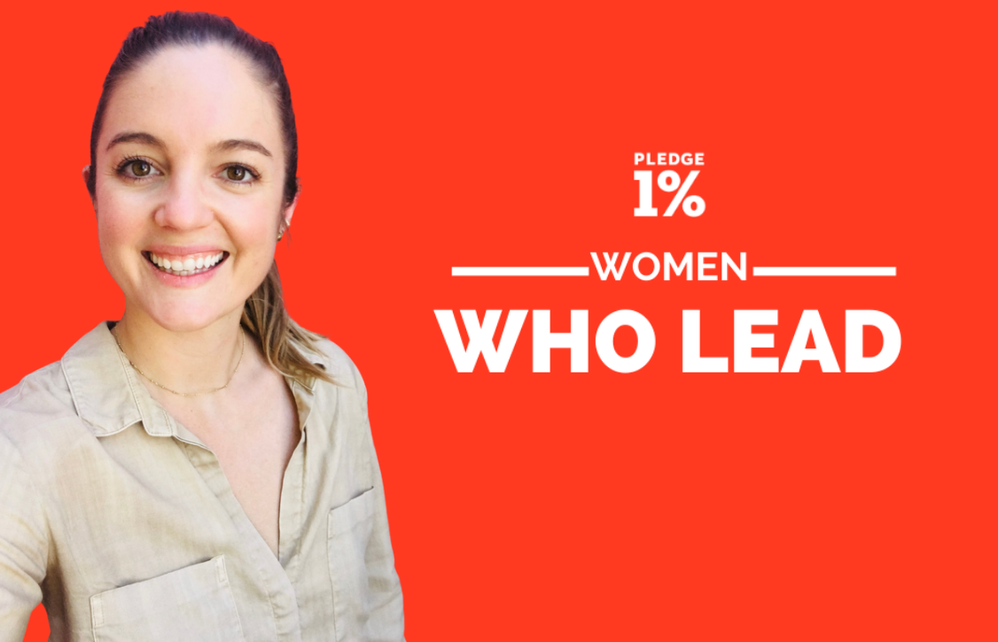
Sam Hartsock
Co-Founder & Partner, qb. consulting.
San Francisco, CA, USA
What is your current role? Briefly describe in 1-2 sentences.
Sam leads qb.’s strategy, materiality, and stakeholder engagement services, helping Fortune 500s to rapidly growing SMEs design resilient and responsible business strategies that put people first. Alongside leading client work, Sam manages qb.’s day-to-day operations and works to execute the company’s vision: to create a world where all organizations prioritize inclusive, diverse communities and invest in climate resilience, with partner in all things qb., Noemí Jiménez.
This year’s International Women’s Day theme is “Embrace Equity.” What does this mean to you? How can we build workplaces that are more equitable and inclusive?
To me ‘Embrace Equity’ means you are doing the self work. What can be overlooked is creating the conditions to have conversations with ourselves that build inner awareness of race, privilege, and power in day to day moments. You have to first supportively challenge yourself. Then you’ll be ready to show up, actively listen, and codesign equitable solutions with communities whether that’s where you live or inside the company you work for.
Do you have any mentors or role models who have helped you on your personal journey?
Yes. From day 1, my mom and gran. I am blessed to have these women by my side. They are my rock, my source of faith, my safe place, and the ones who taught me to question the status quo. Other mentors (whether they know it or not!) have been Ayesha Barenblat, Founder and CEO of Remake, Alison Taylor, Professor at NYU Stern and ED at Ethical Systems, and Sonali Arurkar, Executive and Leadership Coach. The way these women have managed teams, led organizations, advocated for change, and used their voices and power permanently shaped me.
What’s the best piece of advice you ever received?
The one piece of advice that has never left me came from Brittany Packnett’s TedTalk. She said:
“Confidence is one of the main things missing from the equation…[It] is the necessary spark before everything that follows. Confidence is the difference between being inspired and actually getting started, between trying and doing until it’s done…[Yet], finding confidence is not a solo sport. It requires permission, community, and curiosity, and it’s something we can and must spark in each other.”
Confidence is the magic mix needed for transforming business as usual and solving our greatest social and environmental challenges.
Packnett goes on to say that when we have a world that isn’t “intimidated by confidence when it shows up as a woman or in black skin or in anything other than our preferred archetypes of leadership”, we can unlock a future where justice is real and inequity is outdated. Knowing that confidence is the missing piece and that it shouldn’t be exclusionary or privileged reminds me of the need to uplift others in everyday moments.
As managers, as leaders, as colleagues, as clients, and even as consultants, we have the opportunity to help others grow their confidence seeding future changemakers.
So I always ask: Who’s confidence I am building and does it reflect the diversity of voices needed to change our world?
You can watch Brittany Packnett’s full TedTalk here.
The past few years have brought many new and unprecedented challenges. What keeps you motivated or inspires you to stay optimistic?
The people I get to work with every day at qb. Our consultants are a diverse collective of impact and content strategists, writers, analysts and community engagement specialists who are committed to working putting people first in the work we do. They show up everyday humble and hungry. They are new moms, under grad and grad students, and career shifters and I am continuely inspired by and learn from the people I work with.
Pledge 1% helps companies of all sizes and stages leverage their assets for social good. Why do you think it’s important that companies prioritize social impact? Do you have any specific stories or examples from your work or colleagues you can share?
My cofounder, Noemí, and I starated qb. because we saw the need for a sustainability/ESG consulting firm that truly centered the “S”. qb. was founded on the premise that diversity, equity and inclusion are good for business. That there must be more diversity in who is consulting on sustainability strategies. And we were committed to impact from day 1, donating 1% of our profits since 2017. Orignially this solely went to the Internaltional Rescue Committee but as we’ve grown we’ve gotten to diversify the organizations we donate to focusing on local community groups that advance equity and justice.
If you could describe yourself in one word what would that be and why?
Curious
Do you have any unique or useful life hacks to help get through your day?
Yes! The Urgent vs Non Urgent + Important vs Non Important 2×2 matrix. I belive this is called the: four-quadrant “Eisenhower Decision Matrix” for importance vs. urgency. I used to start my day by drawing this matrix and filling in each box. It quickly (and visually) help me understand what required my attention and when and more importantly what I could delegate. Today, I use this more as an ongoing mindset. As an entreprenuer, you have alllll the types of asks come your way. It’s been such a helpful to clean my mind space.
Do you have any go-to apps or tools use love to use?
No. I try to keep my systems and platforms limited. People were only meant to be so efficient.
What are you looking forward to this year? Are there any goals (personal or professional), activities, or experiences you are excited about?
Personally, yes! This year I am finally getting my puppy baby a backyard. I’ll be making good on an 11-year promise. Ginger has been doing a lot of city living with me and we’re are finally moving back to the burbs. Professionally, my team spoke at GreenBiz this year about a 12-month climate justice listening tour we conducted. The engagement and the conference were both milestones for us. I’m excited to see the ripple effects of this work and turn what we heard into action as we work with the client and the local community to codesign a climate equity strategy.
Pledge 1%’s #WomenWhoLead series celebrates female leaders who are paving the way for the next generation. While our featured leaders come from a variety of backgrounds and industries, they are united in their efforts to promote equality for all women in the workplace. We’ve asked them to share a bit about their journey to success, as well as lessons they’ve learned along the way.
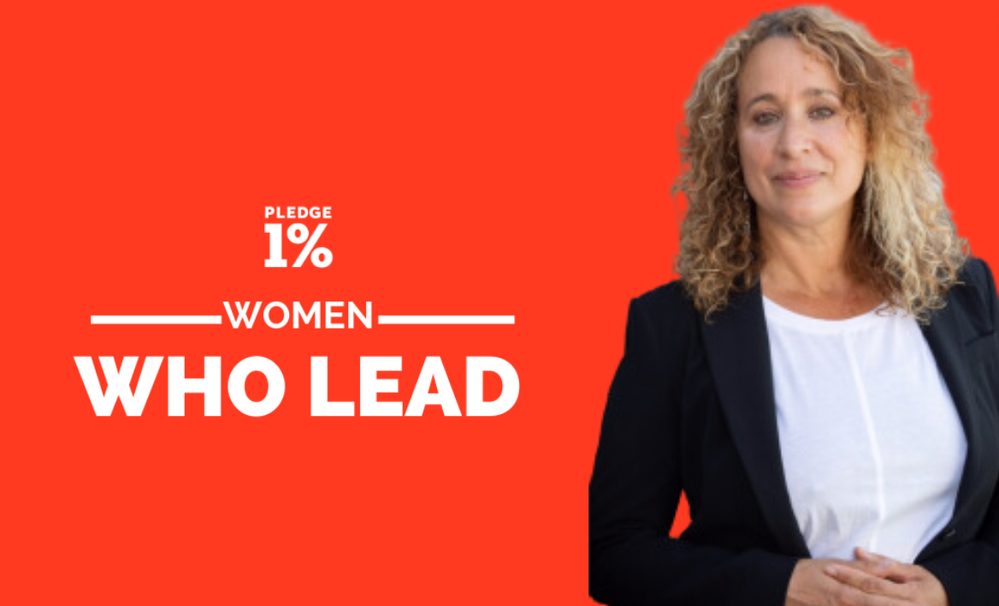
Dana Bryson
SVP of Social Impact, Study.com
Denver, Colorado, USA
What is your current role? Briefly describe in 1-2 sentences.
Dana Bryson leads Study.com’s social impact and double bottom-line strategy, working to build new mission-aligned partnerships, and manages the company’s policy and strategic positioning.
This year’s International Women’s Day theme is “Embrace Equity.” What does this mean to you? How can we build workplaces that are more equitable and inclusive?
This year’s International Women’s Day theme of “embrace equity” is very personal to me. At the age of 15, I represented Denver as part of an official Sister Cities Delegation, as we visited our Sister-City of Nairobi, Kenya for the U.N. Conference on the Decade for Women. While in Nairobi, I attended and participated in the International Women’s Forum with my mother and brother, and volunteered my time working in the “Peace Tent” to offer feminist analyses on gender equity by Adrienne Rich and Charlotte Bunch, that my mother had published as part of a feminist press she created while also working as an attorney. I am a biracial woman of color whose parents had the first legal interracial marriage in Virginia four days after the Supreme Court struck down that state’s anti-miscegenation law in the landmark case of Loving vs. Virginia.
Embracing equity in all forms has been an integral part of my life. This mindset has followed me throughout my career, most recently in my current position as the Senior Vice President of Social Impact at Study.com, where I design and lead our work to Make Education Accessible. Having spent more than a decade in executive positions in Oakland, Washington, D.C., and Denver and having substantial education in public policy, I design and build data-driven initiatives that have a tangible and measurable impact on equity in education and student learning outcomes.
Data is still the queen and through Study.com’s programs, our team is gathering and analyzing robust data and gaining great insights about the outcomes of our collaborative interventions. I’m looking forward to evaluating it all from a quantitative point of view so we can double down and continue to improve our initiatives to help make education accessible.
While I love working to build systems and frameworks to support a more just and equitable society, my work feels the most rewarding when our program participants–real people–share the impact of our initiatives on their lives, families, and career. I call that equity in action.
For example, our Working Scholars program offers working adults the opportunity to earn a debt-free bachelor’s degree, and since its inception, over 150 students—more than half of whom identify as first-generation college students–have completed their degrees, and more than 20% report a salary increase directly related to their participation in the Working Scholars Program. One of our 2022 graduates, Tiaka Hyatt-Geter, told us that she was able to receive a fast-tracked promotion at her job that was only possible once she finished her degree. In her own words, “It’s very expensive and costly to remain in poverty. Had I not gone back to school [through Working Scholars], it would have been impossible for me to remain in the Bay Area.” These real-life stories motivate me and our team as we aim to achieve equity and unlock educational opportunities through our work.
For good or for bad, the commitment to an equitable and inclusive workplace starts at the top when a company’s leadership team values diverse perspectives in the pursuit of business goals. Organizational culture must reflect and reinforce a strong foundation of and commitment to open-mindedness and transparency across the organization in decision-making processes. This leadership ethos needs to mirror a broader culture of trust and understanding, where all employees feel heard and valued. In addition, having a leadership team comprised of people with different backgrounds and life experiences, and who trust each other and work together to create clear goals, helps to foster an environment where inclusivity and equity are prioritized.
Company leaders should seek out diverse perspectives from employees at all levels and assure them so that they can feel comfortable sharing their experiences and ideas. I firmly believe that authority should be pushed down in an organization, allowing all employees to provide input and play a more active role in shaping the company’s culture, direction, and results.
Do you have any mentors or role models who have helped you on your personal journey?
Robert Bobb has been a significant mentor and role model in both my professional and personal journey. As the longest-lasting Black city manager in the country, Robert has extensive experience in municipal government, serving the cities of Oakland and Washington D.C. I had the honor of serving with him in Oakland, California and also was his Chief of Staff when he was city manager of Washington D.C. The impact of his mentorship on my career continues today as I work to lead from my values, question decision making, and keep the voiceless in mind when I choose what to speak out about. Although we don’t work together on a professional basis currently, I still carry his words of wisdom and leadership advice with me every day. His advice to “hire good people and get out of their way” is one piece of wisdom that has stayed with me as I’ve grown and built teams over the years.
As a City Manager, Robert held his colleagues to the highest standards, expecting and insisting on excellence, but not perfection. He understood mistakes would be made along the way, but he empowered us to strive for quality and thoughtfulness of the work we delivered. He has also consistently demonstrated courage as a leader as he spoke truth to power on countless occasions, knowing that there may be backlash. Robert taught me that it’s okay to make unpopular decisions when you are staying true to your beliefs as a leader.
What’s the best piece of advice you ever received?
Dr. Camille Cates Barnett, another career mentor who served as the city manager of Austin, Houston, Dallas, Philly and Washington, D.C. once advised me to “Shut up and quit it.” The “shut up” half of the phrase reminds us to choose what to share and with whom and not to shop around for validation of your decision once it is made. And to successfully “quit it,” we must silence the voices in our heads that tell us that we’re not good enough or don’t deserve to be where we are.
Sharing information with others is a way to democratize power, but it is different than oversharing, which fails to respect boundaries and can even result in your information being used against you. The key is to stop doubting yourself and trust in the abilities you have.
The past few years have brought many new and unprecedented challenges. What keeps you motivated or inspires you to stay optimistic?
My family, breathing, and Earth itself are my sources of optimism despite the challenges that persist in our world. I know firsthand the absolute joy of motherhood, and being a mother is just divine. My parents’ activism has made them role models for me in both my career and personal endeavors as I work to bring people together in a more just world. As a 25-year practitioner of yoga, I experience firsthand how the simple act of breathing relieves chronic or acute stress. Mother Earth is screaming, and I hear her call. She calls me to the mountains and to continue my 25+ year work as an urban farmer and advocate, and to continue my work toward environmental justice and a healthy planet.
In the almost three decades I have spent working to make this a better world–as an advocate, activist, founder, funder, board chair, advisor, and executive leader–I have extreme professional curiosity in challenging companies and brands to scale their impact and to lead from their values. In these challenging times, Pledge 1% is in a unique position to educate, advocate and convene, and push companies of all sizes and stages to leverage their assets for social good.
Pledge 1% helps companies of all sizes and stages leverage their assets for social good. Why do you think it’s important that companies prioritize social impact? Do you have any specific stories or examples from your work or colleagues you can share?
As the Senior Vice President of Social Impact at Study.com, I lead the company’s efforts to Make Education Accessible with its “double-bottom line” strategy, by building partnerships with others who are aligned with our mission. Study.com has donated $27 million through two national education initiatives, l) Working Scholars program, which offers working adults the opportunity to earn a debt-free bachelor’s degree, and 2) Keys to the Classroom, which aims to accelerate pathways to certification for educators by helping them prepare for and pass their teacher certification exams.
Did you know that a major barrier for aspiring teachers is passing their teacher certification tests, a problem that is exacerbated among teacher candidates of color? Nationally, fifty percent of teacher cadets fail the Praxis exam on the first try, and a quarter never pass. These pass rates disproportionately affect people of color–38% of Black students never pass the exam. In response to ongoing teacher staffing issues exacerbated during the pandemic—ranging from classroom vacancies to the lack of educator diversity–we launched Keys to the Classroom in late 2021 to diversify the teacher workforce and accelerate educator pathways by providing free teacher certification test prep support to aspiring teachers. Since its launch, the program has expanded into 20 states and has thousands of participants enrolled, half of whom identify as people of color and 60% of whom identify as 1st generation college graduates.
If you could describe yourself in one word what would that be and why?
It’s technically two words: “radical kindness.” The principles of yoga have guided me in understanding who I am, who I want to be for others, and how I can best serve as a leader. Radical kindness is one value that I’ve deeply integrated into my psyche, and I bring this mindset into the workplace every day. My goal as a manager and an executive, and as a human, is to lead consciously and with compassion in every interaction.
Do you have any unique or useful life hacks to help get through your day?
Say a blessing every morning before your feet touch the ground. Write your ideas with markers on massive sheets of paper. Always start with a clean sheet and use colors. Observe what you see, then draw the connections and watch what appears. Notice when you need to find 10 minutes to sit in silence, then do it and watch your productivity and focus skyrocket.
Do you have any go-to apps or tools use love to use?
As a parent of a 10 and 12-year-old, I love using apps and tools that make it easier to understand what’s happening in children’s worlds. I have several education/school-related apps on my phone, and my favorites are those that help streamline communication and save time. In addition, my plant identifier, garden shovel, and handheld lemon juicer are my go-to tools for my garden and home.
What are you looking forward to this year? Are there any goals (personal or professional), activities, or experiences you are excited about?
For six years I have been a Board Chair of World Child Cancer USA, and I am proud of our work in low- and middle-income countries and of the 8,000 children we treated last year in thirteen countries. In 2021 we met with the Secretary General of the World Health Organization and urged the WHO to create a new global goal for survival rates for pediatric cancer — 60% by 2030, which is more than double the current global cure rate.
As a board member of Conservation Colorado, I work to support candidates and policies that protect the Earth and her natural resources, and I am inspired by our 10-year-old daughter’s leadership on these issues in our community.
Finally, as an Urban Farmer and the Chair of the National Advisory Board of Denver Urban Gardens, I am working with the leading doctors, researchers, advocates and organizers to grow food and grow community, at scale.
On a recent birthday, I committed that I would take one nature vacation every year with a close group of female friends, and this year we are off for a 10-day hike and soak in Iceland.
Originally posted on Salesforce.com
Salesforce Philanthropy Q4 Recap: Catalyzing Education, Environment, and Economic Opportunity
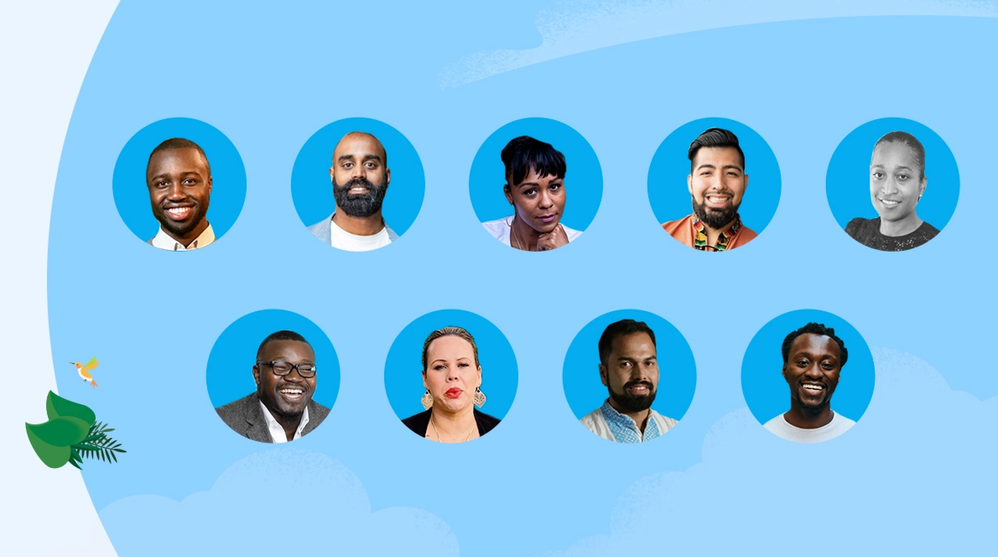
Giving back is built into Salesforce’s DNA. When the company was founded 24 years ago, we committed to giving back 1% of our time, 1% of equity, and 1% of product to our communities – and that was before we even had anything to give.
Now, as we turn our focus to a new fiscal year, we reflect on the incredible impact this model has driven to date. At the close of the fourth quarter of fiscal year 2023 (January 31, 2023), Salesforce has:
- Donated a total of $614 million in grants
- Provided 7.8 million employee service hours
- Supported more than 50,000 nonprofit and higher education customers through our software
Read on to learn how our fourth quarter funds made an impact.
Expanding support to 20 new grantees of the Salesforce Catalyst Fund
In the fourth quarter, Salesforce broadened the impact of its Catalyst Fund by providing $2 million in flexible capital to 20 new grantees – including 10 Black-led organizations forging pathways to education and career success for U.S. youth, and 3 organizations closing the education gap and creating career pathways for Indigenous students in Australia.
The Salesforce Catalyst Fund, which launched in June, supports 20 nonprofits in Australia, the UK, and the United States, and provides critical, unrestricted capital to nonprofits led by underrepresented leaders to counter historic gaps in philanthropic investments.
Click through the slideshow here to see some of the latest Catalyst Fund recipients and their goals.
Elevating economic opportunity through giving
Today talent is everywhere — but opportunity is not. Only about 7% of people have college degrees, and many from underserved communities lack access to the education and networking opportunities needed to secure jobs in technology.
In the fourth quarter, we accelerated our longstanding mission to widen access to economic opportunity by providing $1 million total in grants to COOP Careers and Ivy Tech as they work to expand career opportunities in their communities.
Accelerating progress on $100M climate commitment
In the fourth quarter, we made strides towards Salesforce’s $100 million climate commitment, bringing total progress to date to $12 million. We also launched the Salesforce Accelerator for Nature to provide nonprofits with unrestricted funding, technology, and pro-bono support. The first cohort of the Accelerator is supporting Global Forest Generation (GFG), GreenWave, Island Conservation, and Rainforest Connection – helping ecopreneurs bring promising solutions to market.
Providing disaster relief to communities in need
At Salesforce, we are committed to supporting our communities, particularly in a time of crisis. We help prevent the impacts of future disasters through our technology and philanthropic grants, prepare humanitarian NGOs with proactive investments before disaster strikes, and empower our employees with the tools and resources to safely and effectively respond.
In response to the recent Turkey-Syria Earthquake, our early investments in disaster relief jumpstarted response efforts for our humanitarian partners, CARE, Save the Children, IFRC, and World Central Kitchen, so they could be on the ground within 24-48 hours. Within a matter of days, Salesforce employees mobilized a grassroots campaign to raise more than $850,000 in employee donations and corporate matching.
Within a matter of weeks, Salesforce employees mobilized a grassroots campaign to raise nearly $1 million in employee donations and corporate matching.
Moving forward, our vision remains focused on using our business as a platform for change and leveraging our philanthropy to build a more equitable and sustainable world for all. We look forward to the many opportunities ahead to drive impact in 2023 and beyond.
Pledge 1%’s #WomenWhoLead series celebrates female leaders who are paving the way for the next generation. While our featured leaders come from a variety of backgrounds and industries, they are united in their efforts to promote equality for all women in the workplace. We’ve asked them to share a bit about their journey to success, as well as lessons they’ve learned along the way.
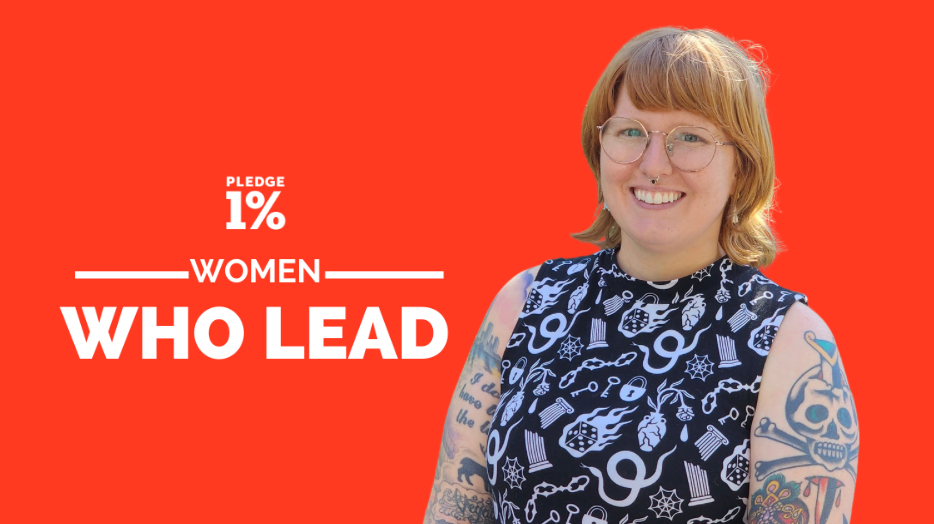
Disney “Diz” Petit
Founder & CEO, LiquiDonate
Oakland, CA, USA
What is your current role? Briefly describe in 1-2 sentences.
I am the founder and CEO of LiquiDonate where we work to build a world without waste.
This year’s International Women’s Day theme is “Embrace Equity.” What does this mean to you? How can we build workplaces that are more equitable and inclusive?
A lot of people say that they embrace equity, but what does that really mean? As a female in leadership for over a decade I could give you a different answer on what embracing equity looks like and does not look like for each day.
I worry that the more we have ‘themed’ days the less meaning the words have when only a small group spends time reflecting on them.
The women who were nominated to present in this series have some level of power and influence to increase equity within their organizations and potentially inspire others, but I find it also important to reflect upon who isn’t in this conversation. Are those the people who will read this and react? I am not sure but I am open-minded to see what others define as embracing equity this year.
If any reader prefers a less esoteric answer, I’m happy to provide one. I’m just so exhausted with buzzwords and quick content that doesn’t mean much if it isn’t getting into the hands of people who don’t already agree that we should be ’embracing’ or ‘enabling’ or whichever word of the day comes through.
We definitely follow the ideas and ideals of the UN SDG’s around equity and believe that our product helps work toward those goals.
Do you have any mentors or role models who have helped you on your personal journey?
The team at LiquiDonate is what keeps me going everyday since we started our journey toward a world without waste.
What’s the best piece of advice you ever received?
Assume positive intent.
The past few years have brought many new and unprecedented challenges. What keeps you motivated or inspires you to stay optimistic?
As long as I am alive and capable I will try to do what is most helpful. In 2020 I broke my back from a fall downstairs carrying a blind foster dog at 7am. You never know what can change your life.
Pledge 1% helps companies of all sizes and stages leverage their assets for social good. Why do you think it’s important that companies prioritize social impact? Do you have any specific stories or examples from your work or colleagues you can share?
Yea! You can build cool and impactful stuff that makes a difference that only you and your company are well-suited for. For example, my current co-founder of LiquiDonate and I built FoodFight! while we were at Postmates. It enabled restaurants we worked with to just press a button and have a courier come pick up their excess food and take it to local shelters in 800 cities across the US.
If you could describe yourself in one word what would that be and why?
Attempting? I spent time thinking on this one and I feel that the word that best describes me right now is attempting. I am attempting to do the right things, make the right choices, listen, help where I can, learn, and more. All of it feels like an attempt and I think that is a fun, scary, and exciting part of my current journey.
This is a hard one. Feel free to submit your one word descriptions of me to diz@liquidonate.com
Do you have any unique or useful life hacks to help get through your day?
If you have the privilege of having a salaried role with less restrictions around your time, use your dang calendar. Schedule your day hour by hour, including blocking off whatever ‘you’ time you need to protect whether it’s a gym break, lunch, or what time you need to leave to not be late for a date night.
Do you have any go-to apps or tools use love to use?
My google calendar ❤️
What are you looking forward to this year? Are there any goals (personal or professional), activities, or experiences you are excited about?
This year traveling resumes with some volunteering in Turkey, a conference and company retreat in Hawaii, a personal vacation to Japan, and then some much needed time at home around the holidays. I am so lucky and excited to be where I am today and am always happy to connect with others who have questions about the space, especially while navigating it as a woman in the tech industry.
Pledge 1%’s #WomenWhoLead series celebrates female leaders who are paving the way for the next generation. While our featured leaders come from a variety of backgrounds and industries, they are united in their efforts to promote equality for all women in the workplace. We’ve asked them to share a bit about their journey to success, as well as lessons they’ve learned along the way.
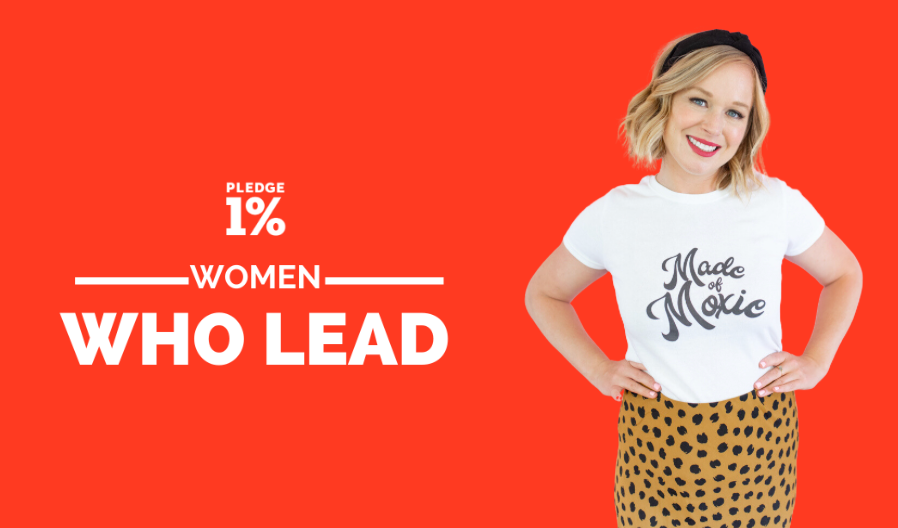
Lis Best
Executive Coach and Founder, Girls Club Collective
Oakland, CA, USA
What is your current role? Briefly describe in 1-2 sentences.
I am an executive coach for women in sustainability and social impact, founder of the Girls Club Collective, the intentionally intimate community for change agents, and host of the Women Changing the World podcast.
This year’s International Women’s Day theme is “Embrace Equity.” What does this mean to you? How can we build workplaces that are more equitable and inclusive?
I love this year’s theme because it’s about giving people what they need to achieve equitable outcomes – not simply giving everyone the same access to opportunity. It recognizes that we are not born onto an equal playing field, and that if we want a different future than our present reality, we need to allocate resources differently to get there.
To build workplaces that are more equitable and inclusive, we need to create mechanisms that actually help women and minorities advance to positions of power – and stay there. That means going well beyond creating one seat at the table. It can also mean, in many cases, giving employees access to spaces with totally new tables and resources to help them lead and thrive.
Do you have any mentors or role models who have helped you on your personal journey?
Yes! I have too many mentors and role models to count. One person who has been especially influential on my journey is Molly Gavin – I reported to her for six years when I was just getting started in my sustainability career, and I learned so much from her! Truly, she taught me so many things, from how to write a great email to how to effectively run a meeting and enable cross-functional collaboration. Not only that, but she really inspired me to imagine and embody a different kind of leadership than I had been exposed to before – leadership defined by authentic relationships, strategic thinking, and fun.
What’s the best piece of advice you ever received?
One of the best pieces of advice I’ve ever received is that you get more information through action than through endless strategizing, so be willing to take messy, imperfect action and learn from it vs. trying to have the perfect game plan with all the details figured out before you begin.
The past few years have brought many new and unprecedented challenges. What keeps you motivated or inspires you to stay optimistic?
The women I have the privilege of working with keep me motivated and inspire me to stay optimistic! There are so many brilliant, talented change agents working so hard (and smart!) on so many of the different challenges facing the planet and humanity. I feel like there’s nothing they (we!) can’t do, and whenever I’m feeling down about whether we’re making progress fast enough, I take a look around and am reminded that a) it’s going to take all of us, and b) it’s a marathon, not a sprint.
Pledge 1% helps companies of all sizes and stages leverage their assets for social good. Why do you think it’s important that companies prioritize social impact? Do you have any specific stories or examples from your work or colleagues you can share?
It’s important for companies to prioritize social impact because business can be such a force for good. After spending many years working on impact with massive companies and organizations, it has been interesting to explore the different ways to apply an impact lens to my own small business.
Pledge 1% offers such a useful framework for thinking about how to bake impact in from the very beginning in a way that makes sense. For me, that has looked like giving 1% of my time through pro bono coaching with the Women’s Impact Alliance and donating 1% of revenue to support women’s access to reproductive healthcare.
There are a lot of ways that we can create the future we want to see through our businesses, like being thoughtful about who we hire, how we pay people, and what we buy. Pledge 1% offers an additional opportunity to commit core business resources – in our case, time and money – to creating a more just and sustainable world.
If you could describe yourself in one word what would that be and why?
My favorite word to describe myself is moxie. It’s a great word, and it captures a lot of the energy and magic behind my coaching, consulting, speaking, and approach to life.
Do you have any go-to apps or tools use love to use?
Too many to count! Some of the most helpful tech tools in my day-to-day are Calendly, Honeybook, Reclaim.ai, Voxer, and Circle. I also love the Chani astrology app for insights and meditation.
What are you looking forward to this year? Are there any goals (personal or professional), activities, or experiences you are excited about?
This year, I am most excited about the official launch and expansion of the Girls Club Collective, the intentionally intimate personal and professional development community for women changing the world. This is something I’ve been thinking about and building for more than a year, and it’s so exciting to officially open to the doors to such an amazing group of women! I’m really looking forward to seeing how it evolves over time and to being able to spend more of my time focusing on connection and community.
Pledge 1%’s #WomenWhoLead series celebrates female leaders who are paving the way for the next generation. While our featured leaders come from a variety of backgrounds and industries, they are united in their efforts to promote equality for all women in the workplace. We’ve asked them to share a bit about their journey to success, as well as lessons they’ve learned along the way.
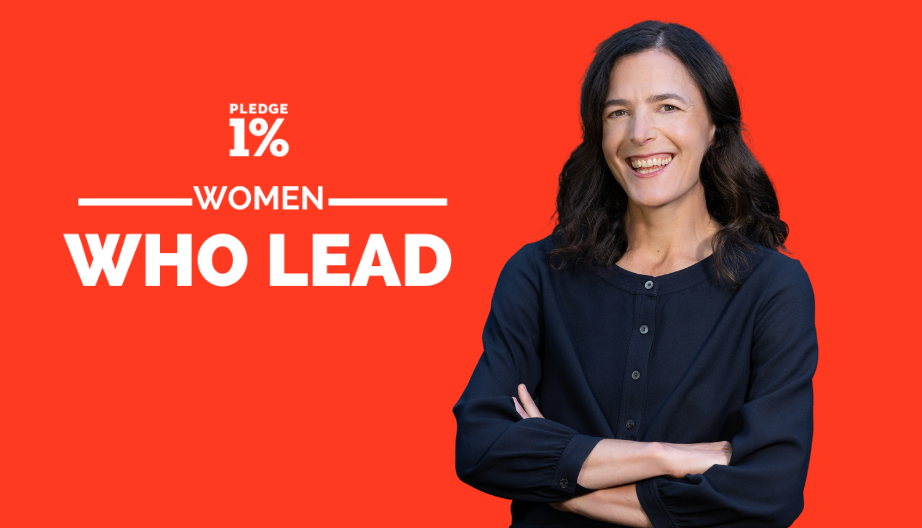
Becky Ferguson
SVP of Philanthropy & COO of Salesforce Foundation, Salesforce
Seattle
What is your current role? Briefly describe in 1-2 sentences.
As SVP of Philanthropy, I direct grant operations for all Salesforce giving, which exceeds half a billion dollars to date. I’m also COO of the Salesforce Foundation where I help set our grantmaking strategy, build alignment and partnerships, and drive our mission to equip all young people with the skills and opportunities to reach their full potential.
This year’s International Women’s Day theme is “Embrace Equity.” What does this mean to you? How can we build workplaces that are more equitable and inclusive?
To me, equity isn’t a one off activity, it’s a lens we should apply to everything we do. This includes building values-aligned practices, policies, and systems that reinforce and center equity in your work.
If we want to build more equitable and inclusive workplaces, we need to create more equitable and diverse talent pipelines. We know that talent is equally distributed, but opportunity is not—and we need to close that gap.
One of the best ways to do this is by investing in untapped talent, or young people from underserved and underrepresented communities who may be unaware of or lack access to the career possibilities that exist for them.
As companies, we can open the doors of opportunity by providing diverse career pathways for untapped talent. This can mean building out internship and apprenticeship programs. It can mean dropping the college degree requirement for new hires and focusing on skills instead.
The past few years have brought many new and unprecedented challenges. What keeps you motivated or inspires you to stay optimistic?
What keeps me optimistic is all the innovation from new leaders and organizations. Last year we launched the Salesforce Catalyst Fund, an initiative that provides unrestricted startup capital for younger or smaller nonprofits led by people of color and other underrepresented groups. These are up-and-coming organizations that may have been traditionally overlooked by philanthropy.
We’ve seen incredible impact come from these nonprofits, like The Hidden Genius Project, which has created a nationwide movement to train and mentor Black male youth in technology creation, entrepreneurship, and leadership skills to transform their lives and communities.
Pledge 1% helps companies of all sizes and stages leverage their assets for social good. Why do you think it’s important that companies prioritize social impact? Do you have any specific stories or examples from your work or colleagues you can share?
We know that for our business to thrive, our communities need to thrive. That’s why social impact is so important.
23 years ago we pioneered the 1-1-1 model, and it is still one of the most innovative in the industry – that’s because it empowers any company at any stage to give back. We are proud to be part of the global Pledge 1% movement of 18K companies around the world that are activating the full power of their business for social good — from their philanthropic funding, to their employee talent and time, to their products.
One of my favorite examples of the impact we can have when we partner together is our work with Stephen and Ayesha Curry’s Eat. Learn. Play. Foundation. We provided $1M in funding to them to launch a pilot program to provide a scalable, sustainable solution to help schools, families, and farms combat food insecurity and food waste due to the pandemic. In addition to the philanthropic investment, a range of partners such as Oakland Unified School District, World Central Kitchen, Numi Foundation, Full Harvest, along with volunteers — came together to deliver 1.7 million pounds of food to nearly 126,000 families facing hunger.
Do you have any unique or useful life hacks to help get through your day?
One practice I picked up from my dad is the power of a daily jog. It doesn’t have to be long or fast, but just getting outside on a regular basis to move in the fresh air really helps me hit the reset button. My dad is in his early 80s and still gets out almost every day for his jog. I hope I can say the same! He also set a now long-running tradition of getting me a new pair of running shoes annually. Each year on my birthday, a pair of colorful sneakers arrives from my dad serving as a little reminder to keep it up.
Do you have any go-to apps or tools use love to use?
I love a classic hard cover Moleskin journal. There is something very special about unwrapping a new one and the invitation to put pen to paper and fill it with new ideas, thoughts, and learning.
What are you looking forward to this year? Are there any goals (personal or professional), activities, or experiences you are excited about?
I am excited to look at how the practice of listening shows up in my work. This includes building connections and ties with other leaders in the social impact space, and creating trusting relationships with our partners. We are embarking on a new body of work to reimagine how we engage our grantees as thought partners so that together we can identify areas for improvement, new partnerships, and transformative philanthropic needs and opportunities. I am excited to share more about what we learn from this effort in the year ahead.